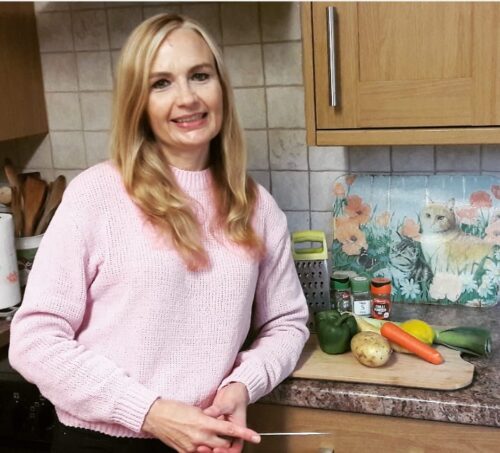During the summer I’ve drastically reduced my cholesterol level, and several people have contacted me to ask how, which is why I decided to write this blog post.
Just before lockdown, in March, I discovered that my cholesterol level was 8.1 – very high. It was a massive shock and a wake-up call. I’m almost 4 years sober and since stopping drinking it’s been hard to battle some old eating disorder issues. I’d got a sixth sense that my level might be up but still didn’t really believe it when the results came through, even though there is a history in my family (a tendency rather than the hereditary sort), plus the relatives with high cholesterol also suffered from dementia, and that’s what really scared me.
So I completely changed my diet for the next 3 months and reduced that worrying number to 5.6. I was thrilled.
But I wasn’t just pleased with that figure – 5 months in, now, it’s no over-statement to say that my life has transformed. For over thirty years I’ve been plagued by my eating disorder issues and now they’ve more or less disappeared. And it’s changed my mental health overall, leaving me feel more balanced and able to deal with the challenges of the past few months regarding my work and the pandemic. I’m not leaning on anything for support that is going to have unhealthy consequences. I’m back in the driving seat and that’s a powerful thing.
It’s a healthier lifestyle I’d recommend to anyone, not just those with high cholesterol.
I’ve hugely reduced my fat and sugar intake (isn’t as bad as it sounds as I demonstrate below) just in the same way I cut out alcohol in 2016. So I’m no longer having to continually battle, internally, over what I eat – I simply can’t eat fat or sugar like I used to, so it’s not even a thought that I have, along with the constant push and pull of *I want it but shouldn’t*, *I’m a bad person I’ve just eaten that chocolate* *I’ve had one biscuit, I may as well have the packet* *I’m not going out as I must look hideous*. So this aspect of my mental health has vastly improved, and my husband has commented several times, over recent months, how much I’ve changed – usually when I’m doing a silly dance to make him laugh (poor man!).
I truly believe I am eating like humans were meant to now – hardly any processed foods or ready meals, no fizzy drinks, plenty of whole grains, fruit and vegetables… and I feel fantastic for it. I’ve also lost 1 1/2 stones along the way, although that wasn’t my goal.
I don’t say this in a sanctimonious way. Sweet treats and ready meals have their place for people with no dietary health concerns. We lead busy, stressful lives. All I’m saying is sometimes those things we lean on – food, booze – can take control, with miserable and dangerous consequences, instead of us being the one truly in charge of what we consume.
The best thing is that I have no cravings. When I imagine eating a processed biscuit, a well-known brand, I immediately feel like wanting to eat several, my mouth almost salivates… but when I imagine eating my own low-baked goods or any of the low-fat treats I might buy… nothing. Those urges just aren’t there.

Here’s what I did – and just to add, I am not medically qualified. If you are at all concerned about your cholesterol or want to change your diet for any reason, you should consult your doctor first.
Firstly, I went on the Heart UK website my own doctor suggested I consult. I CANNOT RECOMMEND THIS SITE HIGHLY ENOUGH – it will explain cholesterol and tell you everything you need to remove from, or add to your diet, and the recipes are fantastic.
Benecol – I’ve added products into my diet that contain plant stanols. These are proven to lower cholesterol. I have a yogurt drink on my breakfast every day, and use the Benecol light spread.
Oats are great at lowering cholesterol. I never used to be a huge fan of porridge but have it every other day now with blueberries, strawberries, chopped walnut halves, a Benecol no added sugar yogurt drink and a teaspoon of Agave syrup (instead of honey) – and even I think it’s pretty delicious! I alternate this with fruit and muesli. Also, when baking, sometimes I’ll add in oats to replace some of the flour.
Choose good fats, foods that are rich in unsaturated fats – it’s the saturated fat that you need to avoid that so often appears in processed foods, and animal products. So I eat walnuts for breakfast every day, avocado now and again, oily fish at least a couple of times a week, salmon and tuna being my favourite, and olives. And use vegetable based oils and spreads. Fats are an important part of the diet, just the right ones.
Low fat baking – it’s easier than I thought. The Heart UK site has some great recipes for savoury dishes but also a load of sweet treats like muffins and flapjacks, and there are many, many healthy recipes on the internet. It often means swapping butter for yogurt and I use the Benecol spread to bake with as well. Also fruits and vegetables can be used to make baking taste sweet without all the sugar, such as banana loaf, pear flan, carrot cake, blueberry rock cakes – the list of low fat/calorie recipes on the internet is endless and quite adventurous. If you go to @samanthatongeauthor on Instagram there are many photos of everything I’ve baked.
This baking aspect has been really important for me because I am a great coffee and cake lover and it means that I don’t feel deprived or as if I am missing out. And more than once the family has said they prefer these recipes as they don’t feel over-full afterwards.
Puddings are no problem either – fruit crumbles with a healthier topping, Ambrosia light rice pudding is nice, and the Heart UK site has a brilliant recipe for a fruit flan that I’ve made several times using different fruits and flavoured essences.
There are low-fat baked snacks to buy that are healthy – some of the flavoured oat biscuits by Nairns taste lovely, Soreen loaf bars are great, tea cakes are okay too, popcorn and popchips crisps… it’s about doing your research and looking at labels. Look at the fat content. Look at the saturated fat content. Look at the traffic light labels.
There are plenty of healthy ways to fill up – wild or brown rice, home-made potato wedges using a little olive oil spray and herbs, boiled potatoes with their skins on, wholemeal bread, and, of course, lots of veggies, salads and fruit.
Exercise is also key to lowering your cholesterol – I do a ten minute (yes, that’s all) cycle ride first thing and a couple of walks (to the shops or around the block) during the day. So it doesn’t need to be difficult.
Eating out is also fine. Do your research online. Study menus (many put the calorie content on there these days, and that’s a guide). I recently went out to an Indian restaurant and stuck to the tandoori dishes as they are cooked in a drier way, in a clay oven, they aren’t curries with possible rich, fatty sauces. I also had boiled rice, a Tandoori roti on the side (flatbread) and a salad as well. Lovely!
Desserts out are more of a challenge, but I’m in the process now of occasionally adding a treat to my diet – maybe a pudding out, a hot chocolate now and again – and then have agreed with my doctor I’ll have my cholesterol tested at Christmas, to see if it’s made much difference.
Of course, not all people will be able to lower their cholesterol through diet – and at that point you will need to discuss other options with your doctor. But changing to a healthier lifestyle regardless can only be beneficial for you physically and mentally, in the short and long term.
It can sound daunting at first but stick with it – I don’t think twice about cooking everything from scratch now and my palate has completely changed, I just don’t crave the foods I used to comfort myself with. I’m so much happier, I feel so much fitter and most importantly, I’m no longer as scared about my health in the future. In fact I feel better about everything and my new more balanced way of living helps me deal with the ups and downs of an author’s life.

